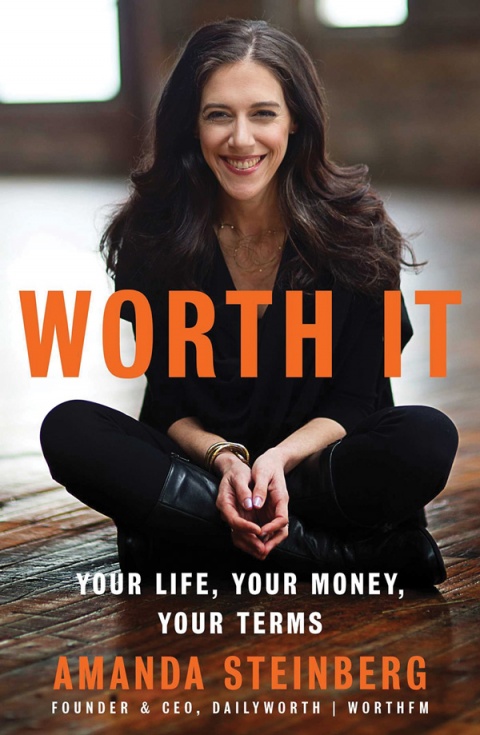Columbia College | Columbia University in the City of New York
Amanda Steinberg ’99 Redefines a Woman’s Worth
By 21, Amanda Steinberg ’99 was running her own office. By 25, she was making six figures. By 29, she had founded a million-dollar software company. So how did the longtime hustler find herself unexpectedly $100,000 in debt a year later?

The short answer: She had no clue how to manage money. And if someone as successful as she could have that big a financial blind spot, what hope do the rest of us have? The realization led to Steinberg’s next start-up, in 2009: DailyWorth.com, a financial hub for women unlike any in the mainstream media at the time, full of personal essays meant to appeal to all aspects of a woman’s wallet. “My hypothesis was if I can repackage and rebrand money in a way that makes it intelligent, but not just focused on, ‘Here’s how to save $10 at the grocery store,’ then I would be able to attract half of the market, which then would be an interest to advertisers,” she says.
Eight years later, Steinberg has adapted her guidance into book form with Worth It: Your Life, Your Money, Your Terms (North Star Way, $26). “Socialized separation between women and money is so much more of a problem than I realized when I started [the website]. The whole identity of what it means to be female is to not be interested in money in most cases,” she says.
Steinberg strove not to sound like a typical finance author, from the cover to the content. “We’re so used to money advice being delivered in a certain way and I felt like I kept being pushed into the formulas. Like my publisher wanted me standing on the cover like Power Woman” — she crosses her arms — “and I was like, ‘That’s not me; it’s not how I project.’ I want to be warm and accessible.”
In the book, Steinberg rails against the gendered financial advice women typically receive, which she believes focuses on the microcosm of the home (earning, budgeting) instead of bigger-picture macroeconomics (saving, investing). “Budgeting is a lot like dieting — both encourage the same type of magical thinking about transformation,” she writes.
Worth It is as much memoir as self-help. In the irreverent, confessional voice that made DailyWorth a success, Steinberg detours into the personal, like her parents’ divorce and her early sexual exploits. She uses her own story to inspire: If she rebounded from $100,000 in debt to build a positive net worth, so can you.
The book features scientific data, psychology studies and anecdotes in the tone of a savvy friend, complete with mini homework assignments to change your inner money narrative. “It’s not that women can’t grasp the subtleties of the financial services industry; it’s that the language is arcane a lot of the time. It’s a full-immersion language course,” says Steinberg’s book editor, Susan Gregory Thomas ’91. “What Amanda does is talk about both investments and the nitty-gritty aspects of budgeting in intelligent but ultimately relatable, practical, you-can-do-this ways.”
For Steinberg, who read The Economist and wore business suits “for fun” in high school, Columbia gave her the opportunity to nally t in, “abnormal sense of ambition” and all. “I always dreamed of becoming an executive,” she says. “I didn’t have a lot of friends because I was intense, you know? We laugh about it now, but it wasn’t cute when I was 19. It was weird. Columbia was the perfect springboard for me to accelerate my career path.”
Case in point: As a senior, Steinberg convinced then-Dean of Academic Affairs Kathryn B. Yatrakis GSAS’81 to let her take a Business School class for her urban studies major. Though the class wasn’t for undergraduates, Steinberg sat in Yatrakis’ office until she made the exception. Steinberg earned an A — and, thanks to a class guest speaker, her first job out of college.
The speaker had a web-development company that hired adults from low-income neighborhoods. Instead of asking for an internship, Steinberg — and her abnormal ambition — thought of something else. “I waited until the whole room cleared out, and here I am, a senior in college, and I was like, ‘I need to open up your New York office.’ He’s like, ‘What? You’re 12.’ And I was like, ‘No, I do,’” she says.
That’s how she ended up managing an entire team right after graduation.
Some might find it strange for a non-writer to launch a content company, but it’s clear from five minutes of chatting that Steinberg is a born storyteller.
“A lot of DailyWorth’s success and the fact that I created this brand that women relate to is because I am able to express it in a way that balances humor, intelligence and irreverence,” she says. “The world does not need another dry money book.”
Yelena Shuster ’09 has written for The New York Times, Cosmopolitan, InStyle and more. She now runs TheAdmissionsGuru.com, where she edits admissions essays for high school, college and graduate school applications.
Issue Contents
Published three times a year by Columbia College for alumni, students, faculty, parents and friends.
Columbia Alumni Center
622 W. 113th St., MC 4530, 6th Fl.
New York, NY 10025
212-851-7852
cct@columbia.edu
Columbia Alumni Center
622 W. 113th St., MC 4530, 4th Fl.
New York, NY 10025
212-851-7488
ccalumni@columbia.edu

